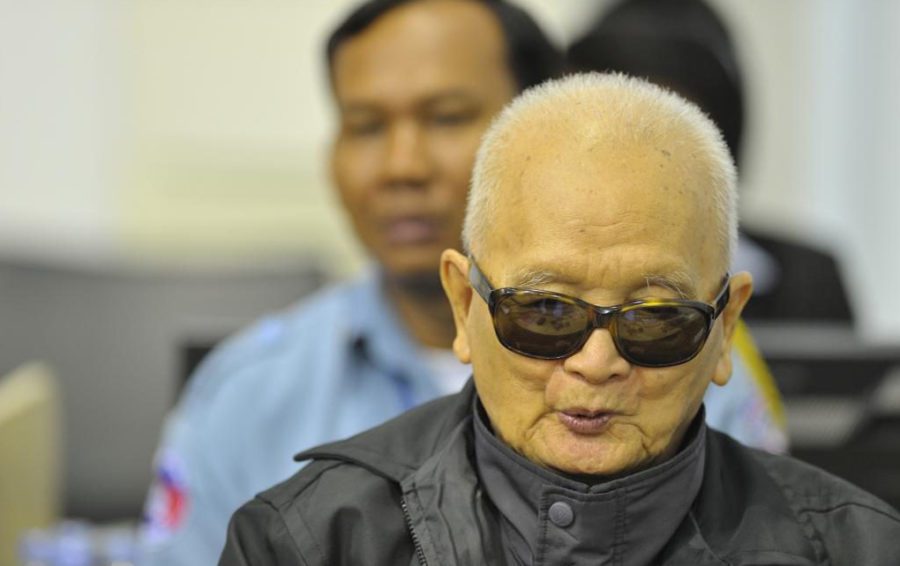Nuon Chea, one of two former senior leaders of the Khmer Rouge to be convicted of the crime of genocide, died on Sunday evening in Phnom Penh, a spokesman for the Khmer Rouge tribunal said in a statement.
Chea, 93, was sentenced to life in prison twice, first in 2014 for crimes against humanity, and second in 2018 for the genocide of ethnic Vietnamese and Cham Muslims as well as other crimes.
He died at the Khmer-Soviet Friendship Hospital after having been transferred there from the tribunals’ detention center for medical treatment on July 2, spokesman Neth Pheaktra said in the statement.
Pheaktra did not answer a question regarding the cause of death, but a tribunal co-prosecutor said Chea suffered from numerous chronic illnesses.
Chea, the former deputy communist party secretary, was known as “Brother Number Two,” serving under Pol Pot and convicted for his role in the genocidal regime, under which some 1.7 million people died from starvation, torture, execution and forced labor from 1975 to 1979.
Chea was convicted for genocide against ethnic Vietnamese within Cambodia, crimes against humanity and breaches of the 1949 Geneva Conventions, alongside Khieu Samphan, the regime’s head of state, in November 2018. His defense attorneys appealed the conviction in July.
Born Lao Kim Lorn in 1926 in Battambang province, Chea studied law at Thammasat University in Thailand, where he joined the Thai Communist Party.
He was made deputy secretary of the Communist Party of Kampuchea in 1960 and maintained the position and his membership in the party’s standing committee throughout the period of Democratic Kampuchea.
Reading the 2018 decision, tribunal judge Nil Nonn said Chea was found criminally responsible for murder, torture and other crimes as “Pol Pot’s loyal right-hand man” who “enjoyed oversight of all [communist] party activities” due to his senior position within the regime.
Both Chea and Samphan were also found guilty of crimes against humanity, including murder, torture, imprisonment and forced marriage and rape in the context of forced marriage, in which cadres forced people to marry and have sex against their will.
Former head of the Khmer Rouge S-21 security centre in Phnom Penh, Kaing Guek Eav, known as Duch, was sentenced to life in prison for crimes against humanity and violations of the 1949 Geneva Conventions in 2012.
According to the tribunal, Chea stayed with the Khmer Rouge until December 1998 — nearly a decade after the regime was routed from Phnom Penh — when he reached a deal with the Cambodian government that permitted him to live near the Thai border. He was arrested in 2007.
Chea never admitted responsibility for his crimes. In 2011, during court testimony, he said, “these crimes — war crimes and crimes against humanity … and genocide — were not for Cambodian people.”
He said Vietnam killed Cambodians.
“I don’t want the next generation to misunderstand history. I don’t want them to believe the Khmer Rouge are bad people, are criminals,” he said. “Nothing is true about that.”
But Youk Chhang, executive director of the Documentation Center of Cambodia, said Chea would be “remembered as the evil of Cambodian history,” with schoolchildren continuing to learn about Chea’s crimes for generations.
“He couldn’t escape God’s punishment,” Chhang added. “The only way to save himself is to die.”
At the age of 93, Chea’s deteriorating health resulted in him spending about four months in hospital in total from March till his death, Chea Leang, a national co-prosecutor at the tribunal, said at a press conference at Khmer-Soviet hospital late Sunday.
His chronic illnesses included heart disease, high blood pressure, pneumonia, final stage kidney disease and gangrene on his toe due to blocked veins, as well as a suspicion of prostate cancer, Leang said, citing his health records compiled by hospital doctors.
The gangrene on his toe “caused him pain every day,” she said.
Due to his well-documented failing health, doctors indicated that an autopsy to determine the cause of death was not needed, and Chea’s family did not request one, Leang said.
“His body will be handed over to his family to organize a traditional funeral ceremony,” she added.
“While the death of Nuon Chea has ended the process of the criminal procedure against him, it is important to note that the appeal by Khieu Samphan against his sentences for the crime of genocide, crimes against humanity and war crimes…will have to go on.”
Additional reporting by Ouch Sony
Updated at 12:30 p.m. with comments from Chea Leang, Khmer Rouge tribunal national co-prosecutor, about Nuon Chea’s health condition at the time of his death.













